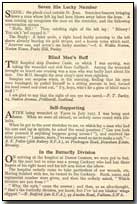Memoirs & Diaries - The Best 500 Cockney War Stories - Self-supporting and Other Stories
 Published in London
in 1921, The Best 500 Cockney War Stories
comprised, in the words of its newspaper publisher (The London Evening
News) "a remembering and retelling of those war days when laughter
sometimes saved men's reason".
Published in London
in 1921, The Best 500 Cockney War Stories
comprised, in the words of its newspaper publisher (The London Evening
News) "a remembering and retelling of those war days when laughter
sometimes saved men's reason".
The collection of short memoirs, some 500 in total, is divided into five categories - Action, Lull, Hospital, High Seas and Here and There. This page contains five stories from Hospital, led by Self-supporting.
Other sections within the collection can be accessed using the sidebar to the right.
Self-supporting
After being wounded at Ypres in July 1917, I was being sent home.
When we were all aboard, an orderly came round with life-belts.
When he got to the next stretcher to me, on which lay a man who had his arm and leg in splints, he asked the usual question ("Can you look after yourself if anything happens going across?"), and received the faint answer: "Lumme, mate, I've enough wood on me to make a raft.
A. E. Fuller (36th Battery R.F.A.), 21 Pendragon Road, Downham Estate, Bromley
In the Butterfly Division
On arriving at the hospital at Dames Camiers, we were put to bed. In the next bed to mine was a young Cockney who had lost three fingers of his right hand and his left arm below the elbow.
The hospital orderly came to take particulars of our wounds, etc. Having finished with me, he turned to the Cockney. Rank, name, and regimental number were given, and then the orderly asked, "Which division are you from?"
"Why, the 19th," came the answer; and then, as an afterthought, "that's the butterfly division, yer know, but I've 'ad me blinkin' wings clipped."
H. Redford (late R.F.A.), 49 Anselm Road, Fulham, S.W.6
An Unfair Leg-Pull
I was working in a surgical ward at a base hospital, and among the patients was a Tommy with a fractured thigh-bone. He had his leg in a splint and, as was customary in these cases, there was an extension at the foot-piece with a heavy weight attached to prevent shortening of the leg.
This weight was causing him a good deal of pain, and as I could do nothing to alleviate it I asked the M.O. to explain to him the necessity for the extension.
He did so and ended up by saying, "You know, we want your leg to be straight, old man."
The Tommy replied: "Wot's the good of making that leg strite w'en the uvver one's bowed?"
Muriel A. Batey (V.A.D. Nurse), The North Cottage, Adderstone Crescent, Newcastle-upon-Tyne
He Saw It Through
In the big general hospital at Colchester the next bed to mine was occupied by a typical Cockney who was very seriously wounded. It was little short of marvellous that he was alive at all.
Early one morning he became so ill that the hospital chaplain was sent to administer the Last Sacrament and the little Londoner's parents were telegraphed for.
About nine o'clock he rallied a little, and apparently realised that the authorities had given him up as hopeless, for with a great effort he half-sat up and, with his eyes ablaze, cried: "Wot? You fink I'm goin' ter die? Well, you're all wrong! I've bin in this war since it started, an' I intends to be in it at the finish. So I just won't die, to spite yer, see?"
His unconquerable spirit pulled him through, and he is alive - and well - today!
A. C. P. (late 58th (London) Division), Fulham, S.W.6
As Good as the Pictures
In Salonika during 1916 I was taken to a field hospital, en route for the Base Hospital. All merry and bright when lying down, but helpless when perpendicular, was a comrade in the next bed to me. We were to be moved next day.
I was interested in him, as he told me he belonged to "Berm-on-Sea," which happens to be my birth-place. Well, close to our marquee were the dump and transport lines, which we could plainly see through the entrance to the marquee.
Sister was taking our temperatures when we heard an explosion. Johnnie had "found" the dump.
An officer ran through the marquee, ordering everyone to the dug-outs, and they promptly obeyed.
I looked at Bermondsey Bill. He said: "We are beat. Let's stop and watch the fireworks."
We were helpless on our feet. I tried to walk, but had to give it up. A new commotion then began, and Bill exclaimed: "Blimey, 'ere comes Flying Fox rahnd Tattenham Corner."
It was a badly-wounded and panic-stricken mule. It dashed through our marquee, sent Sister's table flying, found the exit and collapsed outside.
Sister returned (she was the right stuff) and said: "Hello, what's happened here? And you boys still in bed! Hadn't you better try and get to the dug-outs?"
Bermondsey Bill said: "We'll stick it aht nah, Sister, an' fancy we're at the pictures."
J. W. Fairbrass, 131 Sutton Dwellings, Upper Street, Islington, N.1
Next - Room for the Comforter and four other stories
A "Dixie" (from the Hindi degci) was an army cooking pot.
- Did you know?
